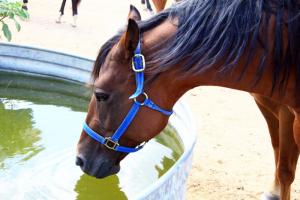By Kentucky Equine Research
How much water does your horse require daily? Several factors influence thirst and water intake.
Average idle horses require approximately 25 liters (7 gallons) of water per day.* + Horses tend to drink in brief episodes or bouts, lasting from 10-60 seconds, up to 20 times a day. Watering system (automatic waterers vs. buckets), temperature, and water quality can alter drinking behavior, as can physiological state, work intensity, and other factors.
According to recent research, horses usually drink directly after a meal, presumably to correct a physiological normal dehydration caused by water being drawn out of circulation by the gastrointestinal tract, specifically the large colon.
“The horse’s large colon can hold a significant amount of water, which allows it to function as a reservoir,” explained Kathleen Crandell, Ph.D., a nutritionist for Kentucky Equine Research. “Water can move easily between the large intestine and the blood circulation depending on the horse’s needs.”
To maintain a sufficient reservoir and adequate volume in circulation, a horse’s water intake must meet losses. Fluid losses occur through urination, defecation, respiration, lactation, sweating, and other evaporative channels. Factors such as ambient temperature, diet (forage vs. pasture vs. concentrates), feeding schedule, transport, exercise intensity, age, and pregnancy status may also affect how much water a horse must consume to maintain hydration.
“Feed deprivation, due to imposed fasting prior to competition or secondary to illness causing anorexia, as examples, can also decrease water consumption,” Crandell noted.
Electrolytes should be replenished with fluid losses, particularly anytime a horse sweats, so this is especially important for performance horses.
*Freeman, D.E., A. Mooney, S. Giguère S, et al. Effect of feed deprivation on daily water consumption in healthy horses. Equine Veterinary Journal. In press.
+NRC. 2007. The Nutrient Requirements of Horses. National Academy Press, Washington D.C.








